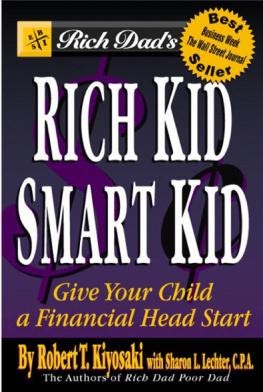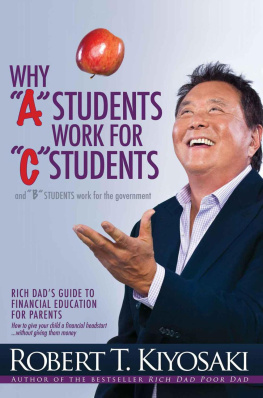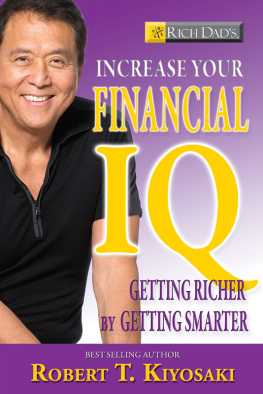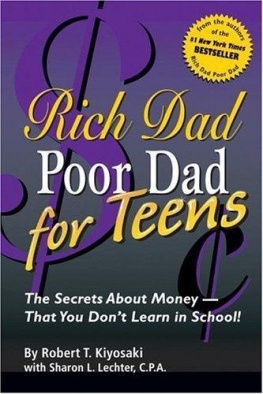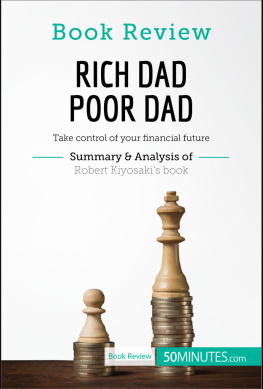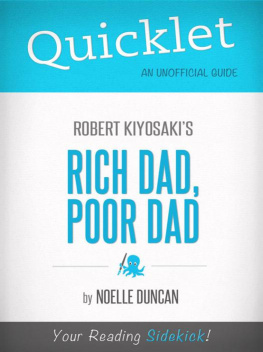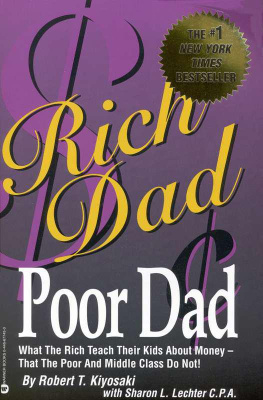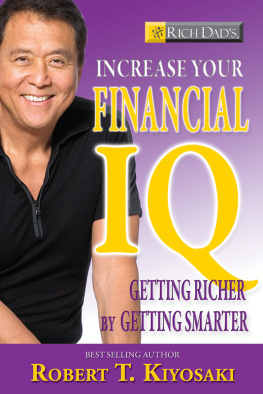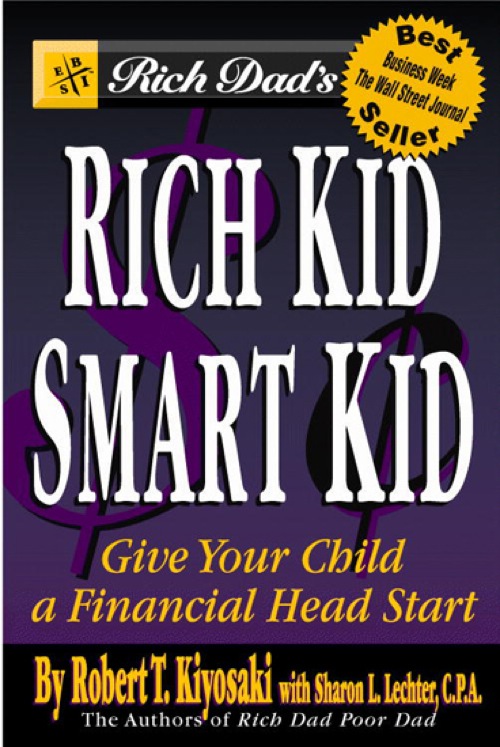Rich Dad Series
RICH KID
SMART KID
Giving Your Child a
Financial Head Start
BY ROBERTT. KIYOSAKI
WITH
Sharon L. Lechter, C.P.A.
Published by Warner Books
A Time Warner Company
This publication is designed to provide competent and reliable information regarding the subject matter covered. However, it is sold with the understanding that the author and publisher are not engaged in rendering legal, financial, or other professional advice. Laws and practices often vary from state to state and if legal or other expert assistance is required, the services of a professional should be sought. The author and publisher specifically disclaim any liability that is incurred from the use or application of the contents of this book.
Although based on a true story, certain events in the book have been fictionalized for educational content and impact.
Warner Books Edition
Copyright 2001 by Robert T. Kiyosaki and Sharon L. Lechter
All rights reserved.
Published by Warner Books in association with CASHFLOW Technologies, Inc.
Monopoly is a registered trademark of Hasbro, Inc.
CASHFLOW is a trademark of CASHFLOW Technologies, Inc.
are trademarks of CASHFLOW Technologies, Inc.
Warner Business Books are published by Warner Books, Inc., Hachette Book Group, 237 Park Avenue, New York, NY 10017
Visit our Web site at www.HachetteBookGroup.com
The Warner Business Book logo is a trademark of Warner Books, Inc.
First eBook Edition: January 2001
ISBN: 978-0-7595-2147-6
Introduction
Why Your Banker Does Not Ask You for Your Report Card
Education is more important today than at any other time in history. As we leave the Industrial Age behind and enter the Information Age, the value of one's education continues to increase. The question today is, Is the education you or your child receives in school adequate to meet the challenges of this brave new world we enter?
In the Industrial Age you could go to school, graduate, and start your career. You usually did not need additional education to succeed simply because things did not change that fast. In other words, the education you learned in school was all you needed for your lifetime.
As millions of baby boomers get ready to retire today, however, many are faced with the realization that they have not been adequately educated for the new world they face. For the first time in history, many well-educated people are facing the same economic difficulties that the less educated are facing. They repeatedly find themselves having to get additional education and training in order to satisfy their current job requirements.
When Do You Measure the Success of Your Education?
When do you measure the success of your education? Is it the final report card the day you graduate from school, let's say at age twenty-five, or is education's effectiveness measured when you retire, let's say at age sixty-five?
In the Sunday, July 16, 2000, issue of my local paper, the Arizona Republic, an article included the following statistic: "About 700,000 seniors will be cut from their Medicare Choice HMOs according to a survey released earlier this month by the American Association of Health Plans."
The article went on to state that providing health care for senior citizens was too expensive and was not profitable for insurance companies, so senior citizens are being dropped from supplemental health care protection. The health care problem for seniors will only increase, as seventy-five million baby boomers hit that age bracket in the next ten years.
Health Education and Welfare Stats
Based on a study performed by the Department of Health, Education and Welfare, of every one hundred people at age sixty-five, one is rich, four are comfortable, five are still working, fifty-six are needing government support or family support, and the rest are dead.
It is not becoming the one rich person that this book is about. It is the fifty-six who still need someone else to support them I am concerned about. I do not want you or your child to wind up in that big statistic.
People often say to me, "I won't need much money when I retire because when I retire, my living expenses go down." While it is true that your living expenses may go down after you retire, there is one thing that often goes up dramatically, and that is health care. And that is why the HMOs (health maintenance organizations) in the previous article are cutting seniors from supplemental medical coverage. Senior citizens are just too expensive to cover. In the next few years it will be clear that health care will literally be a life-and-death issue for millions of older people. Putting it bluntly, if you have money, you may live; and if you don't have money, you may die.
The question is, Did these senior citizens' education prepare them for this financial challenge at the end of their lives?
The next question is, What does the plight of these senior citizens have to do with your child's education?
There are two answers to these two questions.
Answer number one is that it is your child who will ultimately have to pay for the health care of these millions of senior citizens if they cannot pay for it themselves.
Answer number two is another question: Will your children's education prepare them to be financially secure enough not to need government financial and medical support at the end of their working days?
The Rules Have Changed
In the Industrial Age, the rules were go to school, get good grades, find a safe, secure job with benefits, and stay there all your life. After twenty years or so you retire, and the company and the government take care of you for the rest of your life.
In the Information Age, the rules have changed. The rules now are go to school, get good grades, find a job, and then retrain yourself for that job. Find a new company and a new job and retrain. Find a new company and a new job and retrain, and hope and pray you have enough money set aside to last you much longer than age sixty-five because you will live well beyond the age of sixty-five.
In the Industrial Age, the defining theory of the era was Einstein's E = mc2. In the Information Age, the defining theory of the era is Moore's law, which spawned the current ideology that the amount of information doubles every eighteen months. In other words, to keep up with change, you need to virtually relearn everything every eighteen months.
In the Industrial Age, change was slower. What you went to school to learn was valuable for a longer period of time. In the Information Age, what you know becomes obsolete very quickly. What you learned is important, but not as important as how fast you can learn, change, and adapt to new information.

